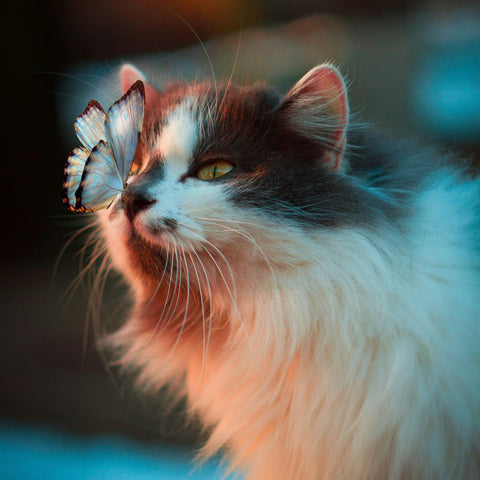Cats are meat eaters. They need to eat meat to survive, i.e. they are obligate carnivores. But you as an owner can rich cat's diet by adding new food and extra nutrients to cat's meal.
Blueberries are renowned for their status as a nutritional powerhouse for humans, packed with antioxidants, fibre, and vitamins. They are a vital part of balanced diet. But what about our feline friends? Can cats eat blueberries?
Cats are curious creatures, known for their selective tastes and sometimes quirky eating habits. As pet owners, we often find ourselves questioning what cat food is safe to share with our furry companions. One such query that arises is whether it's ok feeding cats blueberries.
In this comprehensive guide, we'll explore the nutritional benefits, potential risks, and considerations regarding feeding blueberries to your beloved cat.
The Nutritional Profile of Cat Blueberries
Blueberries are known as superfood. According to health experts those dark little powerful berries are nutritious, delicious, and loaded with vitamins, antioxidants, and minerals.

Furthermore, blueberries have the highest amount of antioxidants of all fruits and vegetables.
💡 Expert Tip:
Did you know, that there are blueberries and then there are BLUEBERRIES? When it comes to nutritional value, wild blueberries are very highly ranked.
Wild blueberries, that have grown in pristine Nordic forests, free from all toxins and chemicals, have extremely high nutritional value.
Why are Blueberries Good for Your Cat?
- Antioxidants: Blueberries contain antioxidants like anthocyanins and vitamin C, which help combat oxidative stress and support overall health.
- Fiber: Fiber aids in digestion and can be beneficial for cats struggling with hairballs or constipation. Perfect fruit treats!
- Vitamins: Blueberries are a good source of vitamins A and K, which contribute to healthy vision and blood clotting, respectively.

Let's delve into the nutritional composition of blueberries to understand if they offer any health benefits to cats.
Are Blueberries Safe for Cat's Diet?
While blueberries boast an impressive nutrient profile, it's essential to consider whether they are safe for feline consumption.

Here are some factors to keep in mind:
1. Digestibility:
Cats are obligate carnivores, meaning cats can eat primarily meat. While fruits are not a natural part of cat's natural diet, small amounts of certain fruits, like blueberries, are generally safe as cat treats in moderation. Treat your kitty to blueberries 1-2 times a week. Large quantities can cause upset stomach.
2. Allergies:
Some cats may have allergies or sensitivities to certain fruits, including blueberries. Let cats eat blueberries gradually and monitor your kitty for any adverse reactions, such as vomiting, diarrhoea, or changes in behaviour. By far, not all cats have allergies, so don't be afraid to try it out. Benefits of blueberries are worth it!
3. Toxicity:
Unlike some other treats and common fruits, such as citrus, cherries, avocados, grapes and raisins, blueberries are not considered toxic to cats.
4. Sugar Content:
High sugar content in cat foods (there may be too much sugar even if it's from natural sugar content found in cat blueberries), can gradually lead to blood sugar-related or digestive issues. So it is important to add berries in small quantities as an addition to main meaty meals, not as a substitute for them. This is not a mayor concern though, as cats lack sweet taste receptors and they are not going to eat large quantities of berries anyway.
Benefits of Feeding Blueberries to Cats
While your cat may not need to eat berries, offering occasional treats like blueberries can provide some health benefits:
-
Dental Health: The texture of blueberries can help clean your cat's teeth and gums, reducing plaque and tartar buildup. To avoid choking hazards, cut bigger berries in half.
-
Weight Management: Blueberries are low in calories and fat, making them a suitable snack to eat in small quantities to prevent weight gain. Feeding your cat only commercial cat foods may be a health risk for overweight or obese cats.
-
Mental Stimulation: As many cat foods feel and taste the same, introducing new textures and flavours through treats like fresh blueberries, can provide mental enrichment for your cat, preventing boredom and behavioural issues.
- Hydration: Blueberries are 85% water, which can help keeping your cat hydrated. Berries can't replace water though, so avoid feeding blueberries as a substitution of water and always keep a bowl of fresh water available.

How to Safely Feed Blueberries to Your Cat
If you decide to incorporate berries into your cat's diet, follow these tips to ensure their safety and enjoyment:
1. Wash Thoroughly:
Rinse blueberries to remove any pesticides or contaminants before your cat eats them. When using Organic Wild Blueberry Powder, blueberry extract from trusted sources, or Dried Blueberries, there is no need to worry about pesticides or contaminants.
2. Offer in Moderation:
How many blueberries should I let my cat have? Limit the portion size to a few berries at a time, as excessive consumption may lead to digestive upset.
Feed two to three blueberries as a treat to your cat, or mix small amount of blueberry powder into wet food one or two times a week, max.
3. Serve Plain:
Avoid blueberries that are canned, frozen, or preserved in syrup; baked human foods as blueberry cake, blueberry muffin, or blueberry bread, as these may contain added sugars or artificial ingredients that are not suitable for healthy cats.
In Conclusion: Can Cats Have Blueberries?
While cats are primarily carnivorous animals, occasional treats like blueberries can be a safe and enjoyable addition to their diet.
Rich in antioxidants, fiber, and vitamins, blueberries offer several potential health benefits for your feline companion. So don't forget: cats can eat blueberries!
However, pet parents should introduce cats blueberries gradually, monitor for any adverse reactions, and always prioritise moderation. Cat's health is your priority!
By following these guidelines, you can safely share the joy of blueberries with your beloved cat.



